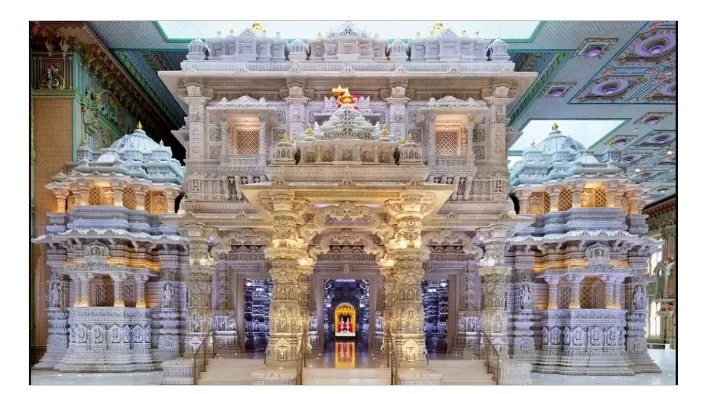Robbinsville, New Jersey, USA – In a momentous occasion set to leave an indelible mark on the global Hindu community, the inauguration of the world’s largest Hindu temple constructed outside India in the modern era is scheduled for October 8 in New Jersey.
Situated approximately 60 miles south of Times Square, New York, and approximately 180 miles north of Washington DC, the BAPS Swaminarayan Akshardham in Robbinsville Township, New Jersey, has been painstakingly crafted over 12 years, from 2011 to 2023, by a dedicated force of more than 12,500 volunteers hailing from various corners of the United States.
Prior to its formal inauguration, the temple, affectionately known as Akshardham, is already drawing thousands of visitors each day, including Hindus and people of diverse faiths, from across the nation. Akshardham boasts impressive dimensions, measuring 255 feet in height, 345 feet in length, and 191 feet in width, sprawled across an impressive 183-acre expanse.
This architectural marvel has been meticulously designed in accordance with ancient Hindu scriptures, incorporating a myriad of design elements derived from the rich tapestry of ancient Indian culture. The temple is adorned with an astonishing array of 10,000 statues and statuettes, along with exquisite carvings depicting Indian musical instruments and dance forms.
Notably, this temple ranks as one of the largest in the world, second perhaps only to Cambodia’s Angkor Wat temple complex, a UNESCO World Heritage site, covering a staggering 500 acres. Comparatively, Akshardham in New Delhi, open to the public since November 2005, spans 100 acres.
Speaking about the vision behind this magnificent undertaking, Aksharvatsaldas Swami from BAPS Swaminarayan Sanstha remarked, “Our spiritual leader (Pramukh Swami Maharaj) had a vision that in the Western hemisphere there should be a place which can be a place for all people of the world, not only for Hindus, not only for Indians, not only for certain groups of people; it should be for all of the world where people can come and learn some values, universal values based in Hindu tradition.”
Akshardham’s unique design comprises a central shrine, 12 sub-shrines, nine shikhars (spire-like structures), and nine pyramidal shikhars. It also boasts the largest elliptical dome in traditional stone architecture, designed to endure for a millennium.
Remarkably, every stone used in Akshardham has a story. Four types of stone, including limestone, pink sandstone, marble, and granite, known for their resilience against extreme weather conditions, were carefully selected. These stones were sourced from various locations worldwide, such as Bulgaria, Turkey, Greece, Italy, India, China, and other regions. The Brahma Kund, a traditional Indian stepwell on the premises, contains water from over 300 bodies of water worldwide, including sacred rivers of India and all 50 U.S. states.
Furthermore, sustainability is a core principle at BAPS, evident in the temple’s solar panel farm, the use of fly ash concrete, and the planting of over two million trees across the globe in recent decades.
This colossal endeavor drew support from volunteers across the United States, guided by skilled artisans from India. These volunteers contributed countless hours to bring Akshardham to life. Their dedication ranged from students to CEOs, doctors, engineers, architects, and individuals from diverse backgrounds.
Akshardham, a testament to Hindu culture and architecture in the Western world, will be formally inaugurated on October 8, under the guidance of BAPS spiritual leader Mahant Swami Maharaj, and will open its doors to visitors on October 18.
As Aksharvatsaldas Swami aptly noted, “Voluntarism is our tradition. There are so many references in our traditional Hindu Parampara (tradition), or scriptures, or our lineage where you can see that Seva (service) in building a temple is very meritorious.”
The construction of this magnificent temple is indeed a lifetime opportunity, leaving a profound impact on those who dedicated their time and effort to its creation.
By PTI







